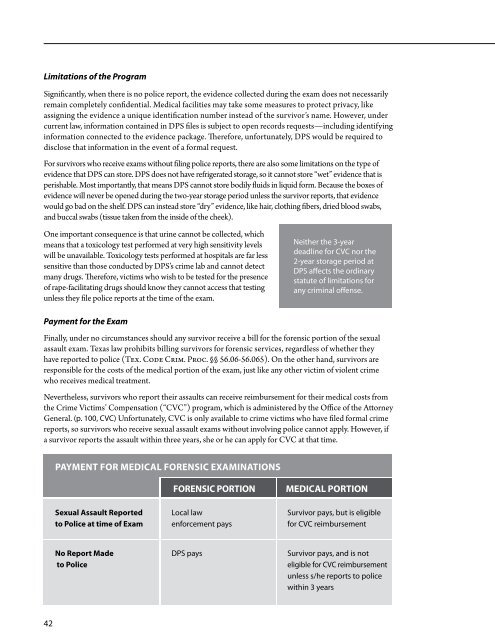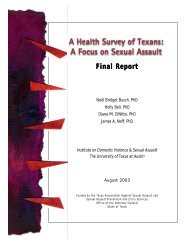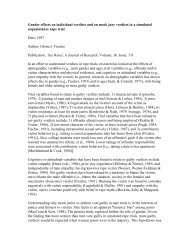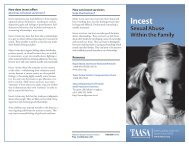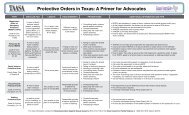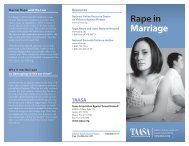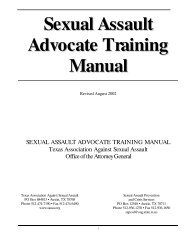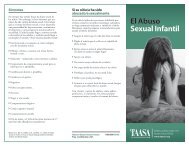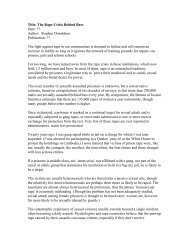Sexual aSSault LEGAL ADVOCACY MANUAL - Texas Association ...
Sexual aSSault LEGAL ADVOCACY MANUAL - Texas Association ...
Sexual aSSault LEGAL ADVOCACY MANUAL - Texas Association ...
You also want an ePaper? Increase the reach of your titles
YUMPU automatically turns print PDFs into web optimized ePapers that Google loves.
Limitations of the Program<br />
Significantly, when there is no police report, the evidence collected during the exam does not necessarily<br />
remain completely confidential. Medical facilities may take some measures to protect privacy, like<br />
assigning the evidence a unique identification number instead of the survivor’s name. However, under<br />
current law, information contained in DPS files is subject to open records requests—including identifying<br />
information connected to the evidence package. Therefore, unfortunately, DPS would be required to<br />
disclose that information in the event of a formal request.<br />
For survivors who receive exams without filing police reports, there are also some limitations on the type of<br />
evidence that DPS can store. DPS does not have refrigerated storage, so it cannot store “wet” evidence that is<br />
perishable. Most importantly, that means DPS cannot store bodily fluids in liquid form. Because the boxes of<br />
evidence will never be opened during the two-year storage period unless the survivor reports, that evidence<br />
would go bad on the shelf. DPS can instead store “dry” evidence, like hair, clothing fibers, dried blood swabs,<br />
and buccal swabs (tissue taken from the inside of the cheek).<br />
One important consequence is that urine cannot be collected, which<br />
means that a toxicology test performed at very high sensitivity levels<br />
will be unavailable. Toxicology tests performed at hospitals are far less<br />
sensitive than those conducted by DPS’s crime lab and cannot detect<br />
many drugs. Therefore, victims who wish to be tested for the presence<br />
of rape-facilitating drugs should know they cannot access that testing<br />
unless they file police reports at the time of the exam.<br />
Neither the 3-year<br />
deadline for CVC nor the<br />
2-year storage period at<br />
DPS affects the ordinary<br />
statute of limitations for<br />
any criminal offense.<br />
Payment for the Exam<br />
Finally, under no circumstances should any survivor receive a bill for the forensic portion of the sexual<br />
assault exam. <strong>Texas</strong> law prohibits billing survivors for forensic services, regardless of whether they<br />
have reported to police (Tex. Code Crim. Proc. §§ 56.06-56.065). On the other hand, survivors are<br />
responsible for the costs of the medical portion of the exam, just like any other victim of violent crime<br />
who receives medical treatment.<br />
Nevertheless, survivors who report their assaults can receive reimbursement for their medical costs from<br />
the Crime Victims’ Compensation (“CVC”) program, which is administered by the Office of the Attorney<br />
General. (p. 100, CVC) Unfortunately, CVC is only available to crime victims who have filed formal crime<br />
reports, so survivors who receive sexual assault exams without involving police cannot apply. However, if<br />
a survivor reports the assault within three years, she or he can apply for CVC at that time.<br />
Bottom Line:<br />
Payment for Medical Forensic Examinations<br />
Forensic Portion<br />
Medical Portion<br />
<strong>Sexual</strong> Assault Reported<br />
to Police at time of Exam<br />
Local law<br />
enforcement pays<br />
Survivor pays, but is eligible<br />
for CVC reimbursement<br />
No Report Made<br />
to Police<br />
DPS pays<br />
Survivor pays, and is not<br />
eligible for CVC reimbursement<br />
unless s/he reports to police<br />
within 3 years<br />
42


